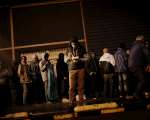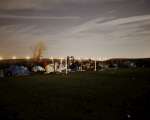Seven factors behind movement of Syrian refugees to Europe
Briefing Notes, 25 September 2015
This is a summary of what was said by UNHCR spokesperson Adrian Edwards – to whom quoted text may be attributed – at the press briefing, on 25 September 2015, at the Palais des Nations in Geneva.
Additional Speaker: Amin Awad, Director UNHCR Bureau for Middle East & N.Africa / Regional Refugee Coordinator for the Syria Region
While more than 4 million Syrian refugees are in countries neighbouring Syria, recent months have seen an increase in the number of Syrians seeking refuge further afield – there have been almost 429,000 asylum applications by Syrians in Europe since 2011. Based on ongoing monitoring and assessments, surveys, focus group discussions, and daily interaction with refugees in Jordan, Lebanon, Egypt and Iraq, UNHCR has identified seven principal factors behind this. The information gathered here mainly applies to Syrians living as refugees in the region, rather than people moving directly out of Syria. ( See UNHCR briefing note of 8 September 2015 on drivers out of Syria.)
Loss of hope
With Syria's crisis now into its fifth year and no sign of a solution in sight, hope is dwindling for many refugees. Feelings of uncertainty about the future are compounded by miserable conditions, fuelling a sense of despair and desperation.
High costs of living/Deepening poverty
Refugees in Lebanon cite the high cost of living as a factor in deciding to stay or go. In Egypt, refugees say it is getting harder to pay rent, manage high levels of indebtedness and afford their basic needs. In Jordan, the inability to provide for one's family was the most common reason cited by people who knew someone who had left.
The cumulative effect of four years in exile with restricted access to legal employment was also said to be taking its toll. In many cases savings are long depleted, precious valuables have been sold off and many refugees across the region live in miserable conditions, struggling to pay rent, feed their families, and cover their basic needs.
Limited livelihood opportunities
Without ability to work, many refugees struggle to make a living. Lack of livelihood opportunities or access to the formal labour market was cited as a problem by refugees in Lebanon, Egypt and Jordan. Syrian refugees in Iraq say the large number of internally displaced people has increased competition for jobs in the Kurdistan region of the country. Meanwhile, work on construction sites in the region has dried up with the drop in oil prices.
The lack of access to legal work leads refugees, desperate to provide for themselves, to resort to informal employment – risking exploitation, working in unsafe conditions or having payment withheld by unscrupulous employers. If caught working illegally, some refugees face sanctions, for example in Jordan being returned to a camp. Under new regulations in Lebanon, refugees must sign a pledge not to work when renewing their residency status.
Aid shortfalls
Aid programmes for refugees and host communities in the region have been plagued by chronic funding shortages. The current inter-agency Syrian regional refugee and resilience (3RP) plan for 2015 is only 41% funded, which has meant cuts in food aid for thousands of refugees, and those that get it having to survive on US$0.45-0.50 a day. Many refugees in Jordan told UNHCR the WFP food aid cuts were the last straw in their decision to leave the country. Tens of thousands miss out on cash assistance, sinking deeper into debt. As a result people resort to negative coping strategies – including begging, child labour, and increased indebtedness. Shrinking humanitarian aid was cited by refugees in Iraq, Jordan, Lebanon and Egypt as cause of desperation and a driver of onward movement.
In Jordan, inadequate funding has seen refugees losing free access to healthcare. As a result, 58.3 per cent of adults with chronic conditions do without medicine or health services, up from 23 per cent in 2014. There is also a marked decrease in access to curative and preventative health care.
Hurdles to renew legal residency
In Lebanon, new regulations for Syrian refugees have made it harder for Syrians to access asylum, and increasingly Syrians transit through Lebanon to Turkey. Refugees already in the country must pay US$200 per year to renew their stay. They are required to sign a pledge not to work and they must present a certified lease agreement. Many refugees are fearful of arrest or detention and feel vulnerable because of lapsed residency visas.
In Jordan, an urban verification exercise launched by the authorities in February to ensure that all Syrians residing outside of camps are issued with a new identity document to access services presents a number of challenges. The cost of obtaining a health certificate (JD30/US$42 for those over 12 years of age) as part of the process can be prohibitive.
Scant education opportunities
Limited education opportunities were cited as a problem for refugees in Jordan, Egypt, Lebanon and Iraq. Education is highly valued among Syrians, who enjoyed free and mandatory schooling at home before the war. The worsening conditions that refugees face in exile are having a devastating impact on the education of refugees. In Jordan, some 20 per cent of children are abandoning school in order to work and in some cases girls are being forced into early marriage. Some 90,000 Syrians of school age have no formal education, with 30,000 of those accessing informal education and the rest missing out completely.
In Lebanon, where education is free to Syrians in a two-shift system, many children struggle to attend while at the same time working to support their families. While the Ministry of Education has increased by 100% the number of places for Syrian children (that is, 200,000 in the 2015/2016 school year), another 200,000 Syrian children will be out of school this year.
Across the region, Syrian youth are missing out on tertiary education and losing hope about their future.
Feeling unsafe in Iraq
The majority of displaced Iraqis UNHCR spoke to who were travelling outside Iraq reported feeling unsafe in the country. Many people from minority groups have told UNHCR they see migration as the key to their physical safety.
For more information on this topic, please contact:
- In Amman, Helene Daubelcour on mobile +962 79 889 1307
- In Beirut, Dana Sleiman on mobile +961 71 910 626
- In Damascus, Firas Al-Khateeb on mobile +963 930 40 3228
- In Geneva, Adrian Edwards on mobile + 41 79 557 9120
- In Geneva, Ariane Rummery on mobile +41 79 200 7617













































